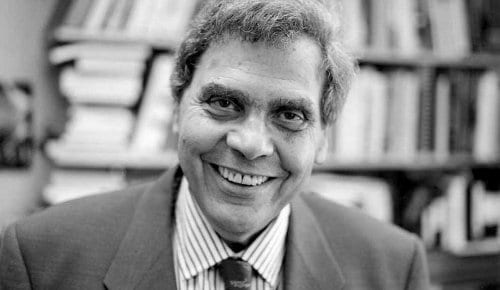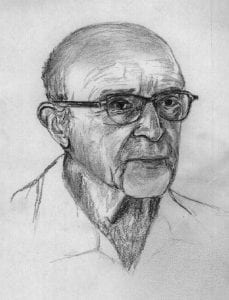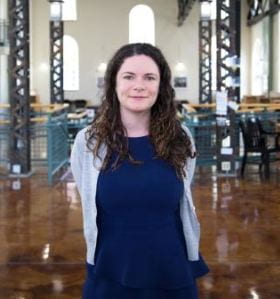
February 8 | 12:30-1:30p US PST | Zoom
In the third offering in Innovators & Insights, a series returning to, rethinking, recontextualizing, and reinvigorating some of the great education and technology thinkers of the past, we delve into the still-highly-relevant (and occasionally practically omniscient) work of Neil Postman, author of Amusing Ourselves to Death, Teaching As a Subversive Activity, and more.
In this active, audience-encompassing, critical discussion, we will delve into Postman’s thoughts on the problems of teaching and learning in an increasingly techno-centric culture and how we might together toward resolving them to create richer, deeper, more meaningful learning environments for our students…and ourselves.
Questions? Contact Chris Lott <clott@uw.edu>
More Information
Biography
Neil Postman (March 8, 1931 — October 5, 2003) was an American author, educator, media theorist and cultural critic, who eschewed digital technology, including personal computers, mobile devices, and cruise control in cars, and was critical of uses of technology, such as personal computers in school.
In 1971, at NYU’s Steinhardt School of Education, he founded a graduate program in media ecology.
Postman’s 20+ books include Amusing Ourselves to Death, Technopoly, and The End of Education.
Books and Ideas
(Note the double-meaning of the word “End” in the title)
Postman contends that the bane of modern education is the lack of common—and as often as possible, compelling—stories that give meaning to it. As Postman puts it, “public education does not serve a public. It creates a public.” Schools focus on “false gods” including consumerism and technology, for which he suggests five alternative narratives:
- “Spaceship Earth” — “human beings as stewards of the Earth, caretakers of a vulnerable space capsule”
- “The Fallen Angel” — “there is nothing more human than the stories of our errors and how we have managed to overcome them, and then fallen into error again, and continued our efforts to make corrections— stories without end.”
- “The American Experiment” — The “great and continuous American argument about the meanings” of important abstractions such as “ustice, honesty, self-discipline, due process, equality, and majority rule with respect for minority rights”
- “The Laws of Diversity” — “sameness is the enemy of vitality and creativity”
- “The Word Weavers/The World Makers” — “Definitions, questions, metaphors—these are three of the most potent elements with which human language constructs a worldview. […] the study of these elements be given the highest priority in school, I am suggesting that world making through language is a narrative of power, durability, and inspiration.”
From Typography to Television: “…as typography moves to the periphery of our culture and television takes its place at the center, the seriousness, clarity and, above all, value of public discourse dangerously declines. On what benefits may come from other directions, one must keep an open mind.”
Teaching and Technology: “[educators] are apt to find new methods congenial, especially if they are told that education can be accomplished more efficiently by means of the new techniques. (That is why such ideas as “teacher-proof” textbooks, standardized tests, and, now, micro-computers have been welcomed into the classroom.)”
Technology, Education, and Literacy: “Educators are not unaware of the effects of television on their students. Stimulated by the arrival of the computer, they discuss it a great deal—which is to say, they have become somewhat “media conscious.” It is true enough that much of their consciousness centers on the question, How can we use television (or the computer, or word processor) to control education ? They have not yet got to the question, How can we use education to control television (or the computer, or word processor) ? But our reach for solutions ought to exceed our present grasp, or what’s our dreaming for? Besides, it is an acknowledged task of the schools to assist the young in learning how to interpret the symbols of their culture. That this task should now require that they learn how to distance themselves from their forms of information is not so bizarre an enterprise that we cannot hope for its inclusion in the curriculum ; even hope that it will be placed at the center of education.”
On disinformation: “Disinformation does not mean false information. It means misleading information—misplaced, irrelevant, fragmented or superficial information—information that creates the illusion of knowing something but which in fact leads one away from knowing. In saying this, I do not mean to imply that television news deliberately aims to deprive Americans of a coherent, contextual understanding of their world. I mean to say that when news is packaged as entertainment, that is the inevitable result. And in saying that the television news show entertains but does not inform, I am saying something far more serious than that we are being deprived of authentic information. I am saying we are losing our sense of what it means to be well informed. Ignorance is always correctable. But what shall we do if we take ignorance to be knowledge?”
Education, Skills, and Technocracy: “There is no set of ideas or attitudes that permeates all parts of the curriculum. The curriculum is not, in fact, a “course of study” at all but a meaningless hodgepodge of subjects. It does not even put forward a clear vision of what constitutes an educated person, unless it is a person who possesses “skills.” In other words, a technocrat’s ideal—a person with no commitment and no point of view but with plenty of marketable skills.”
Redefining “Education”: “You will note that such a definition is not child-centered, not training-centered, not skill-centered, not even problem-centered. It is idea-centered and coherence-centered. It is also otherworldly, inasmuch as it does not assume that what one learns in school must be directly and urgently related to a problem of today. In other words, it is an education that stresses history, the scientific mode of thinking, the disciplined use of language, a wide-ranging knowledge of the arts and religion, and the continuity of human enterprise. It is education as an excellent corrective to the antihistorical, information-saturated, technology-loving character of Technopoly.”
Discussion Facilitators
Todd Conaway, Instructional Designer, UW Bothell
Chris Lott, Learning Designer, UW Tacoma















